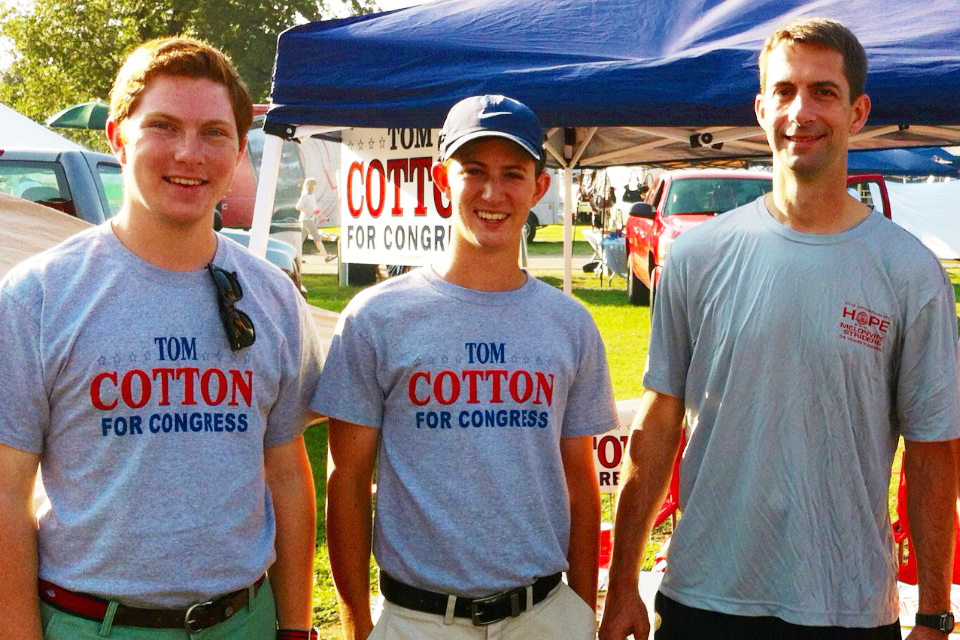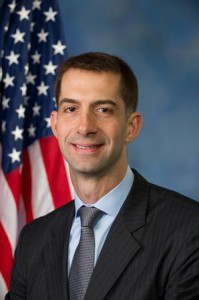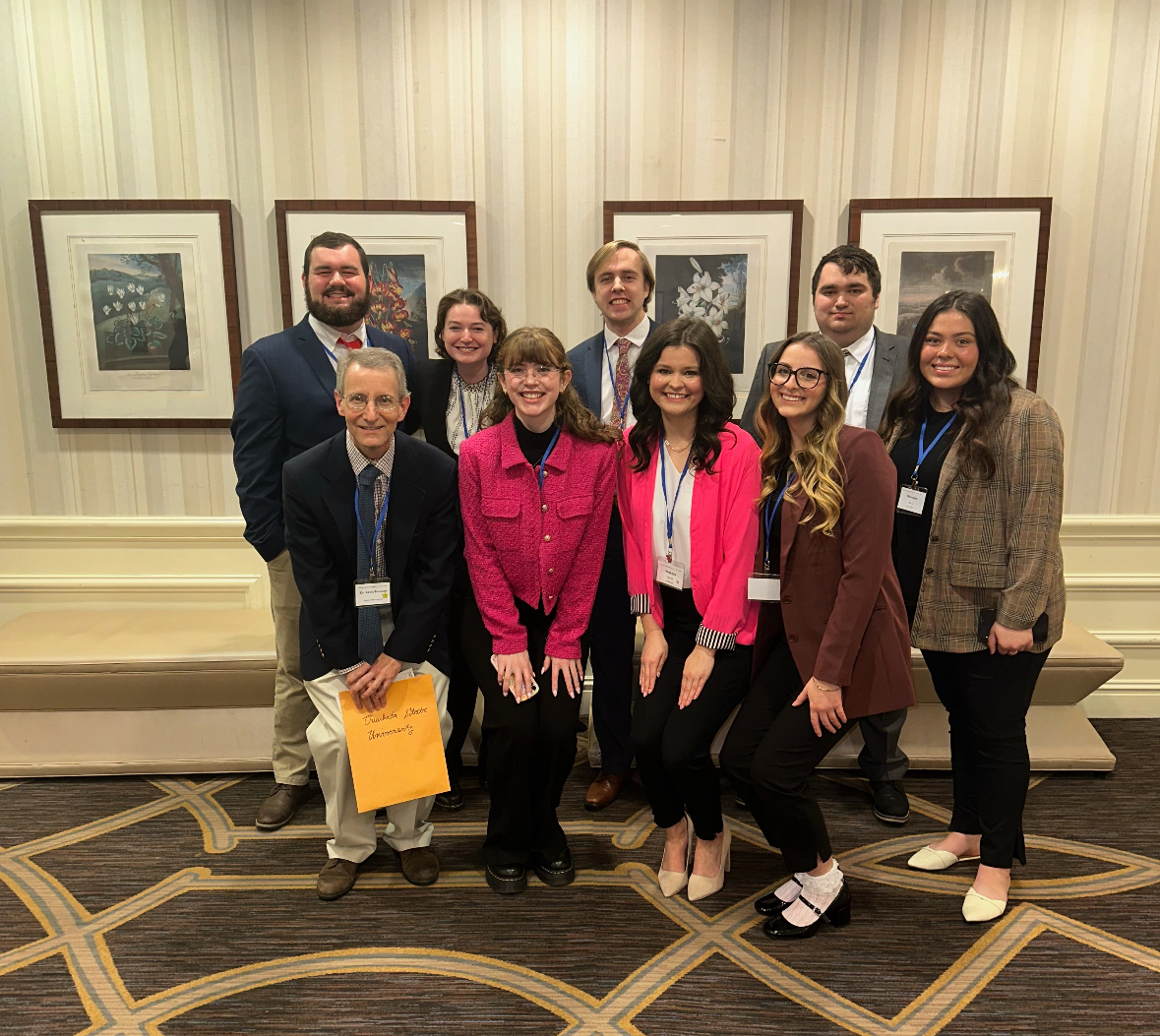
He’s young, he’s tall, he’s poised. He’s Politico’s “Most Likely to Succeed.” He’s a “future Mount Rushmore candidate,” according to the New York Times.
He’s your congressman, and he got elected with the help of two Ouachita students. He’s U.S. House of Representatives member Tom Cotton, and despite being a newcomer to politics, he’s already gained national attention.
Cotton represents Arkansas’s fourth congressional district, which is made up of 33 counties in south and west Arkansas, including Clark County. Cotton visited Ouachita yesterday to meet with president Dr. Rex Horne.
“[Ouachita] is a great institution,” Cotton said. “It provides quality education for students with reasonable tuition and good student aid, so it’s a very valuable asset for Arkansas to get the next generation of leaders — whether it’s business or political or religious — the education and training they need to help move the state forward.”
While on campus, he toured Riley-Hickingbotham Library’s special collections department with library director Dr. Ray Granade, archivist Dr. Wendy Richter and Phil Hardin, assistant to the president. The department houses the papers of other political leaders like Sen. John McClellan and Gov. Mike Huckabee, and is in the process of acquiring the papers of Rep. Mike Ross.
For only 35 years old, Cotton has an extensive resume. He graduated from both Harvard College and Harvard Law School. He worked as a lawyer before joining the Army, where he served two tours of duty before leaving. He then worked for McKinsey & Company, a distinguished consulting firm in New York City, before coming back to Arkansas to work at his family farm.
He announced his candidacy for Congress in 2011 in what would be his first campaign for public office. He was elected in November 2012 and sworn in on Jan. 3.
Dylan Haney, a sophomore political science major, met Cotton the day he filed for office at the Capitol, and immediately joined his campaign.
“We ended up having dinner in El Dorado one night and he was like, ‘Here are some yard signs, and here’s what you need to do,’” Haney said. “I got on early and took care of a lot of stuff for him and stayed on ever since.”
At that point, Cotton’s chances of winning were slim.
“I think he had a three percent chance of winning the election,” Haney said.
Campaigning continued through the spring, and in May 2012, Cotton won the Republican primary.
Haney invited sophomore biology major Jamie Barker to attend Cotton’s primary victory party.
“I had heard of [Cotton] before — I was friends with Dylan — so I knew who he was, but that night, they were looking for people to hire for the summer, and he asked if I wanted a job, and I said, ‘Of course!’,” Barker said.
Haney said Cotton’s chief of staff and district director were both adults, but “his campaign was majority run by college students.”
“It was all college students that made it happen, so that was pretty exciting that he chose to use young students to accomplish that,” Haney said.
On the campaign trail, Haney and Barker attended festivals, dinners and other special events either with Cotton or representing Cotton when he himself could not attend. Haney said each time Cotton received an invitation to attend or speak at an event, the campaign would work hard to make sure somebody could attend.
“We were able to maintain a presence all around the district at every summer festival or race,” Cotton said.
In addition, members of Ouachita’s College Republicans chapter volunteered at some events near the election.
Maintaining that presence was a challenge; Arkansas’s fourth congressional district covers 33 counties across south and west Arkansas — nearly half of the counties in the state — and is home to nearly 700,000 constituents.
Cotton said he chose to have such heavy involvement of college students in his campaign because they “work very hard and they bring a lot of energy to campaigns.”
Haney and Barker said the hardest parts of working on the campaign were the long nights and early mornings.
“There wasn’t a lot of sleep, and there were a lot of 4 a.m. mornings,” Haney said. “You know, campaigning is not always glorious. There was a lot of hard work, but in November, we felt the rewards of our work.”
Cotton received 59 percent of the vote.
Since being elected, Cotton has been recognized numerous times as a rising figure among Republicans. He has been featured on shows including “Larry King Live,” “CNN American Morning” and “Fox & Friends.” Revered publications including the Washington Post and Politico have covered him.
“I think that people were excited to see someone new on the scene that could bring fresh perspective and young charismatic demeanor about himself,” Haney said. “And with Tom’s background, it was pretty evident that he’s very intelligent, and that he’s done a lot for the country, and I think that resonated with people.”
“You know, he went to Harvard and did great there, he worked for a few years and then was like, I want to serve the country, because I feel I could do something good for it,” Barker said. “Then he went over to [the Middle East] and did his thing, came back and decided to run for Congress because he wants to help America here.
“It’s hard not to like someone like that; it sets him apart from everybody else. I think everyone can relate to him; he’s just like a Superman version of a normal Arkansas guy.”
Cotton said he wanted to run for office to preserve the opportunities for the young generation.
“For eleven generations, [our country] has provided everyone liberty and opportunity and a chance to achieve success in the world,” he said, “and I worry that given what’s happening in Washington in recent years, the next generation is not going to have the same kinds of opportunities that every generation before us had.
“I’m not going to leave that burden for the future, so I’m trying to fight for the freedoms that we have to ensure that we will always have them.”
He said among his goals is reform of education and student finance programs.
“[I don’t want] students graduating with a mountain of debt on their own that often times will hinder them from advancing when they are young,” he said. “They have so much debt that they have to repay before they can even get a mortgage, or a car loan, or a loan to start a small business.”
He said he is also working to get the economy growing again so students will “have opportunities for higher-paying jobs with good benefits.”
As much attention as Cotton is getting, a common question is what he will do next. Haney and Barker both agreed: “Big things.”
“Right now, he’s focused on the district and the people, and that’s priority number one,” Haney said. “As far as what the future holds — with him, there’s no telling; we’ll see. He’s going far, and we’ll be lucky to get to help him along the way.”
“Now he’s this big deal, most likely to succeed and stuff, and you can say, ‘I worked for that guy,’” Barker said. “We can just refer to him as Tom. That’s pretty cool.”
Cotton related the legacy he hopes to leave behind to his days in the military.
“It’s the same legacy that you have in the Army when you’re in combat — that you pass on what you have, whether it’s equipment or conditions on the battlefield, better than you found it,” he said. “That’s what every generation of Americans has always done for the next, and that’s what I want to do for the next as well.”
Tom Cotton
U.S. House of Representatives

- Birthday: May 13, 1977
- Home: Russellville, Ark.
- Favorite Color: Razorback Red
- Favorite Food: Ice Cream
- Favorite Music: Johnny Cash or Kid Rock
- Biggest Influence: My parents
- As a child, I wanted to: Be a professional athlete; first baseball, then basketball
- If I had to choose another job, I would be: Editor of The Signal
- Something nobody else knows about me: I’m partly colorblind
“He’s just like a Superman version of a regular Arkansas guy.”
— Jamie Barker, sophomore











